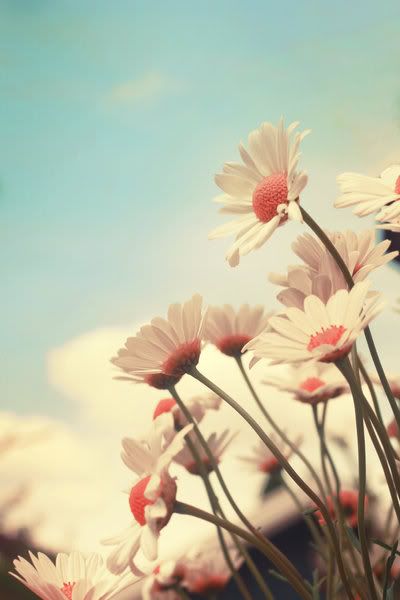
Image from Photobucket.
Daisies always cheer me up. They look lovely just after a rain shower or while bending with the wind. They can stand alone or together in a beautiful meadow. They come in many colors. They might look a bit weedy to some, but the weediness just makes them seem that much stronger. A weed always grows back. So will a daisy showered with love.
The following is an excerpt from What Different Flowers Symbolize:
Daisy
The daisy's name comes from the Anglo-Saxon "daes eage," or "day's eye," which refers to the way the flower opens and closes with the sun. The daisy is knows as a symbol of childhood innocence and is said to originate from a Dryad who presided over forests, meadows, and pastures. Roman mythological legend tells us that the nymph Belides, as she danced with the other nymphs at the edge of the forest, caught the eye of Vertumnus, the god of the orchards. To escape his unwanted attention, she transformed herself into the flower bellis, which is the daisy's botanical name.
Daisies are often confused with chrysanthemums. The daisy continue to be associated with simplicity and modesty, characteristics carried down from the Victorian era. Heartbroken Victorian young women who wished to be loved once again by their suitors began a custom using the daisy, that is still in use today. In Victorian times is was a young maiden would pluck a daisy's petals one by one and sing, "He loves me, he loves me not," for each petal pulled. The last petal so plucked predicted the future of such love.
Young girls might also pick a handful of daisies with eyes closed. The number of blossoms in hand told of the number of years remaining until marriage. Its simplicity has made the daisy a favorite of many poets. Its healing and predictive powers made it popular not only with farmers, but also with an infamous English king. Spring, medieval farmers would say, would not arrive until one could set a foot on twelve daisies. To dream of daisies in springtime or summer was a lucky omen, but dreams of them in fall or winter meant certain doom. Transplanting wild daisies to a cultivated garden was considered to be very unlucky. King Henry VIII ate dishes of daisies to relieve himself from his stomach-ulcer pain. For then, it was also believed that drinking crushed daisies steeped in wine, in small doses over a period of fifteen could cure insanity.
The message that daisies bring are of innocence, purity, and gentleness on behalf of both the giver and the receiver. The daisy's message is, "You have as many virtues as this plant has petals," or, "I will consider your request." A white daisy symbolizes a common feeling of affection, and a red daisy tells of beauty unknown to the possessor.



No comments:
Post a Comment